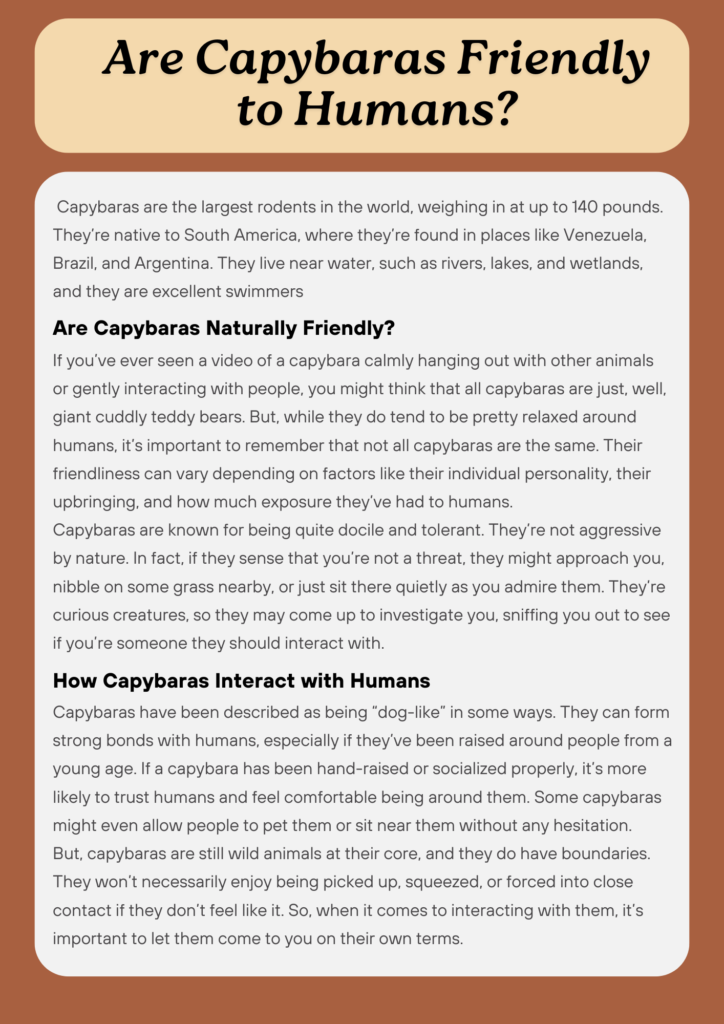Are capybaras friendly to humans? Capybaras have become a bit of a social media sensation lately. With their big, round faces, relaxed demeanor, and slightly curious nature, these large rodents seem to have captured everyone’s hearts.
Well, the short answer is yes, but there’s a bit more to it than just saying “friendly.” Capybaras are often seen as gentle and even affectionate, but not all interactions are guaranteed to be smooth sailing. They are still wild animals, after all. So, let’s dive into what makes capybaras so cool and what you should know if you’re planning to spend time with them.
What Are Capybaras?
Before we get into whether or not capybaras are friendly to humans, let’s quickly cover what these creatures are. Capybaras are the largest rodents in the world, weighing in at up to 140 pounds. They’re native to South America, where they’re found in places like Venezuela, Brazil, and Argentina. They live near water, such as rivers, lakes, and wetlands, and they are excellent swimmers. In fact, they spend a lot of time in the water to stay cool and evade predators.
One thing to note is that capybaras are social animals. They live in groups that can range from 10 to 20 capybaras, and these groups form strong bonds with each other. This social behavior is key to understanding their interaction with humans – they’re naturally social, and they usually don’t mind being around others, whether it’s their own kind or humans.
Are Capybaras Naturally Friendly?
Okay, so back to the question: are capybaras friendly to humans? If you’ve ever seen a video of a capybara calmly hanging out with other animals or gently interacting with people, you might think that all capybaras are just, well, giant cuddly teddy bears. But, while they do tend to be pretty relaxed around humans, it’s important to remember that not all capybaras are the same. Their friendliness can vary depending on factors like their individual personality, their upbringing, and how much exposure they’ve had to humans.
In general, though, capybaras are known for being quite docile and tolerant. They’re not aggressive by nature. In fact, if they sense that you’re not a threat, they might approach you, nibble on some grass nearby, or just sit there quietly as you admire them. They’re curious creatures, so they may come up to investigate you, sniffing you out to see if you’re someone they should interact with. However, it’s key to note that capybaras are not like cats or dogs when it comes to the typical level of human interaction.

How Capybaras Interact with Humans
Capybaras have been described as being “dog-like” in some ways. They can form strong bonds with humans, especially if they’ve been raised around people from a young age. If a capybara has been hand-raised or socialized properly, it’s more likely to trust humans and feel comfortable being around them. Some capybaras might even allow people to pet them or sit near them without any hesitation.
But, capybaras are still wild animals at their core, and they do have boundaries. They won’t necessarily enjoy being picked up, squeezed, or forced into close contact if they don’t feel like it. So, when it comes to interacting with them, it’s important to let them come to you on their own terms. This might mean waiting for them to approach you or, if you’re lucky, letting you gently pet their backs. Some will even let you scratch their heads, which can be quite adorable!
That said, capybaras don’t show affection the same way a dog or cat might. They might not give you the excited tail wagging or purring that you’re used to. Instead, they might communicate their comfort through more subtle cues, like sitting near you or showing you their belly – a sign that they feel safe and secure in your presence.
Are Capybaras Safe to Approach?
So, if you’re lucky enough to come across a capybara, is it safe to approach them? Generally, yes, as long as you’re respectful and mindful of their space. Capybaras are peaceful animals, but they still have instincts and could feel threatened if they think you’re coming too fast or too aggressively. If you’re in a setting where you can safely approach one, like a sanctuary or a controlled environment, it’s okay to gently interact with them.
However, it’s important to read their body language. If a capybara starts backing away, flicking its ears, or showing signs of discomfort, it’s best to give them space. Like any wild animal, they have their own needs and limits, and respecting that goes a long way in ensuring that both you and the capybara are safe.
Can You Have a Capybara as a Pet?
Now, here’s the burning question: Can you keep a capybara as a pet? Well, the answer isn’t as simple as “yes” or “no.” In some places, keeping a capybara as a pet is allowed, but in many regions, it’s illegal due to their status as exotic wildlife. Capybaras require specific care, including access to water, plenty of space, and the companionship of other capybaras. They are social creatures that thrive in groups, so keeping one alone could lead to stress and health problems. Also, their size can make them a challenge to house properly, and they need a special diet and care regimen to stay healthy.
Furthermore, a capybara’s natural instincts may not always align with a domestic setting. They might not behave the same way around humans as they would in the wild or a more natural habitat. For this reason, it’s not always the best idea to have one as a pet unless you’re extremely committed to their specific needs.
Conclusion
So, to sum it up – capybaras are indeed friendly to humans, but like any animal, their behavior depends on their environment, their upbringing, and how they’re treated. They are generally calm, social, and curious creatures, and they can form strong bonds with humans if introduced in a respectful and patient manner. However, it’s important to remember that they are still wild animals with their own set of needs and boundaries.
If you get the chance to interact with a capybara, be gentle and let them come to you. And if you’re thinking about having one as a pet, make sure you research the legalities and requirements thoroughly. After all, as adorable as they are, capybaras are wild animals first and foremost!

